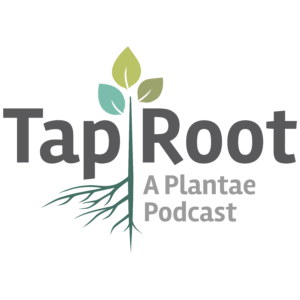Taproot S2E5: Evolving Approaches: Herbicide Resistance in Weeds and What Men Can Do to Fight Gender Discrimination in Science
 In this episode, Ivan and Liz talk with Gina Baucom, Assistant Professor in Department of Ecology and Evolutionary Biology at the University of Michigan. Gina earned her Ph.D. and completed a postdoc at the University of Georgia. She joined the faculty at the University of Cincinnati in 2010 before moving to the University of Michigan in 2013. Gina’s lab integrates ecology, evolution, and genetics in order to understand the persistence of noxious agricultural weeds as well as the evolution of important plant functional traits.
In this episode, Ivan and Liz talk with Gina Baucom, Assistant Professor in Department of Ecology and Evolutionary Biology at the University of Michigan. Gina earned her Ph.D. and completed a postdoc at the University of Georgia. She joined the faculty at the University of Cincinnati in 2010 before moving to the University of Michigan in 2013. Gina’s lab integrates ecology, evolution, and genetics in order to understand the persistence of noxious agricultural weeds as well as the evolution of important plant functional traits.
In this episode we discuss a recent paper from the Baucom lab: “Shifts in outcrossing rates and changes to floral traits are associated with the evolution of herbicide resistance in the common morning glory” Kuester et al., Ecology letters 20(1), 41-49, 2017). Gina describes how she became interested in morning glories and how their recent work illustrates ways in which herbicide resistance can influence mating and thereby evolution of non-agricultural systems.
We also talk about how Gina unintentionally “broke Twitter” with a tweet about sexism in academia. We go over some of the data that demonstrate an unfair disadvantage for women and minorities pursuing careers in science. Gina outlines four major areas surrounding this issue and discusses a number of concrete actions men and women in positions of power can take to invite women scientists into the room AND give them a seat at the table.
How to listen, download and subscribe to The Taproot podcast
SHOW NOTES
Paper:
Kuester, A., Fall, E., Chang, S. M., & Baucom, R. S. (2017). Shifts in outcrossing rates and changes to floral traits are associated with the evolution of herbicide resistance in the common morning glory. Ecology letters, 20(1), 41-49.
Dynamic Ecology Blog post: The Day @gbaucom Broke Twitter
Possible Responses to Gender Discrimination:
- @NeedhiBhalla “What can I Do?” Twitter thread
Adrienne LaFrance article about gender differences in sources for her reporting
Ed Yong did a similar analysis.
Gender Bias in Science–a Short Bibliography
- Clancy, K. B., Nelson, R. G., Rutherford, J. N., & Hinde, K. (2014). Survey of academic field experiences (SAFE): Trainees report harassment and assault. PLoS One, 9(7), e102172
- Zeng, X. H. T., Duch, J., Sales-Pardo, M., Moreira, J. A., Radicchi, F., Ribeiro, H. V., … & Amaral, L. A. N. (2016). Differences in collaboration patterns across discipline, career stage, and gender. PLoS biology, 14(11), e1002573.
- Sex assaults, harassment reported in science fieldwork by Hoai-Tran Bui
- Google Doc Sexual Harassment In the Academy: A Crowdsource Survey. By Dr. Karen Kelsky
Find us on Twitter:
The Taproot is the podcast that digs beneath the surface to understand how scientific publications in plant biology are created. In each episode, co-hosts Liz Haswell and Ivan Baxter take a paper from the literature and talk about the story behind the science with one of its authors.
Subscribe to The Taproot podcast on iTunes or Stitcher.
Questions, feedback, suggestions? Contact us at taproot@plantae.org.





Leave a Reply
Want to join the discussion?Feel free to contribute!